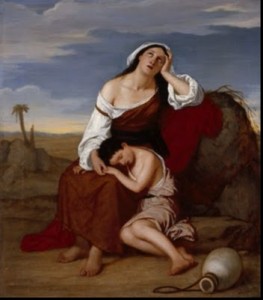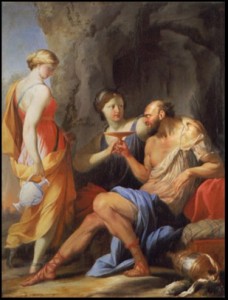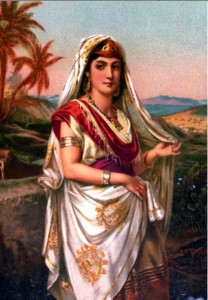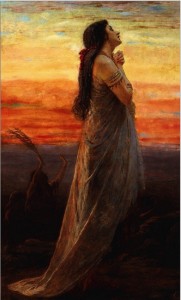In their analysis of Genesis 34 most commentators assume that Dinah was raped by Shechem, the local Hivite prince. Feminists use the story as the textbook example of what is wrong with patriarchy. In addition, Genesis 34 also records the massacre of the Hivite people by Dinah’s brothers in retaliation for the way in which they perceived Shechem had treated their sister. Even today, some ultra-orthodox Jews claim the brothers as heroes for cleansing the land of the Canaanites and look to the narrative as a model for “solving” the current Palestinian “problem.” Continue reading Dinah: Don’t Hang Your Head
Tag Archives: violence against women
Hagar’s Exodus and Exile
Hagar is the only person in the Bible to give God a name and the only woman to be promised a nation. “None of the mothers of Israel is her equal in this regard” (Fischer, p.18). Yet she is subjected to some of the greatest degradation in the scriptures. Her story has even been used to sanction slavery. White American slaveholders in the mid-1800s took God’s command to Hagar “Return, submit,” as legitimizing the slavery system. But the same text has been a source of hope for liberation by African American communities. Continue reading Hagar’s Exodus and Exile
The Silence Itself Turns Into Speech
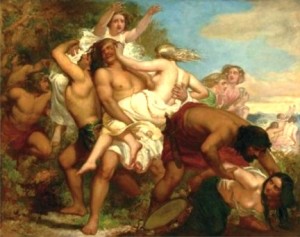 Image credit
Image credit
Women as Property
As part of a whole section of rape legislation, Deut. 21 outlines the laws for taking women as booty during war. Sometimes it is difficult to read the Bible, particularly the rape texts and it’s easy to relegate the Bible to “long ago and far away.” Vastly different from our time, so the argument goes; most ancient cultures stole wives and the Israelites were just fitting in with their neighbors. “[T]he abduction of women by men for marital purposes is a familiar feature in nation-building myths of the ancient world” (Zlotnick, p.47). Furthermore, most often the rape laws and stories are classified as seduction, marriage or love. A traditional commentator “emphasizes the need for marriage as the law’s noble intention. That the marriage is coerced does not become problematic for the commentators” (Scholz, p.109). Here is a typical example of this kind of thinking: Continue reading The Silence Itself Turns Into Speech
Lot’s Daughters
In Deuteronomy God wants to be perfectly clear with Moses that Yahweh has a covenantal relationship with Lot’s descendants and that their lands are to be respected. In other words, God condones the incestuous actions of Lot’s daughters which resulted in the two nations being given ancestral lands east of the Jordan. More than matriarchs of great nations, the daughters are also depicted as the ancestors of Ruth through whom the Davidic and Messianic line flows and Naamah, the Ammonite wife of King Solomon, mother of Rehoboam, King of Judea. Indeed, Lot and his daughters appear to hold an illustrious place in biblical history right alongside Abraham, Sarah and their descendants. As modern readers, we are challenged by this inference and must return to the story of Lot and his daughters to consider more carefully the nuances of this incestuous tale. Continue reading Lot’s Daughters
Cozbi: A Woman Who Bristled
Prior to the story of Cozbi, in Numbers 25, we learn that Balak, the king of Moab, listened to the advice of the mercenary prophet Balaam to entice the Israelites away from Yahweh by encouraging them to fornicate with the Moabite women. The result was a plague that killed 24,000 Israelites. In the midst of this state of affairs, Zimri, the son of the chief of the Simeonites, cohabited with Cozbi, the daughter of a Midianite chieftain. In a rage, the priest Phinehas stabbed the couple to death in order to stop the plague. It seemed to have done the trick. End of story? Not quite. The narrative bristles with possible interpretations that shed more light on Cozbi. Continue reading Cozbi: A Woman Who Bristled
Gomer: Give a Hearing to the Silenced
“When the Lord first spoke to Hosea, the Lord said to Hosea, ‘Go, get yourself a promiscuous wife and children of promiscuity… so he went and married Gomer daughter of Didlaim. She conceived and bore him a son…” (Hosea 1:2-3)
So begins a description of Hosea’s marriage with Gomer. As the Lord instructs, the prophet names the three children she gives birth to as “Jezreel” (“for I will soon punish the house of Jehu [aka Israel] for the bloody deeds at Jezreel”), “Not Accepted,” and finally “Not My People.” Gomer gets the idea–her husband does not accept her or her children. Continue reading Gomer: Give a Hearing to the Silenced
Jephthah’s Daughter: How to Regard the Silence of God
“Then the Spirit of the Lord was upon Jephthah And Jephthah made a vow to the Lord and said, “If you will give the Ammonites into my hand, then whatever comes out from the doors of my house to meet me when I return in peace from the Ammonites shall be the Lord’s, and I will offer it up for a burnt offering.” So Jephthah crossed over to the Ammonites to fight against them, and the Lord gave them into his hand… Then Jephthah came to his home at Mizpah. And behold, his daughter came out to meet him with tambourines and with dances. She was his only child; besides her he had neither son nor daughter. And as soon as he saw her, he tore his clothes and said, ‘Alas, my daughter! You have brought me very low, and you have become the cause of great trouble to me. For I have opened my mouth to the Lord, and I cannot take back my vow.’ And she said to him, ‘My father, you have opened your mouth to the Lord; do to me according to what has gone out of your mouth, now that the Lord has avenged you on your enemies, on the Ammonites.’So she said to her father, ‘Let this thing be done for me: leave me alone two months, that I may go up and down on the mountains and weep for my virginity, I and my companions.’ ” (Judges 11:29-37)
The judge and general Jephthah maked a vow to sacrifice the first thing that came out of his house when he returned victorious from battle. When it was his daughter who danced out of his house, he maked no effort to rescind his oath. To further complicate matters, Jephthah made his vow under the influence of the Spirit of Yahweh. His military victory seems to be a tacit acceptance by God of the terms of his vow. Lev. 27:1-8 stipulates a payment can be made to annul a vow made to God. My first question is obvious. Wasn’t there a way to avert this tragedy? Continue reading Jephthah’s Daughter: How to Regard the Silence of God


